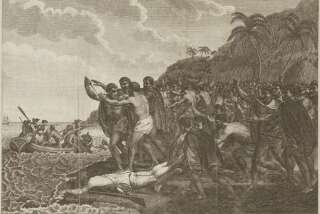A tale of the desert brought vividly to life
Skeletons on the Zahara: A True Story of Survival
Dean King
Little, Brown: 354 pp., $24.95
*
WRITING about a trip he took to Cape Cod in October 1849, Henry David Thoreau said that while exploring the Cape’s upper reaches he and his companion faced “a cutting wind as cold as January.”
“This desert,” Thoreau wrote, “extends from the extremity of the Cape, through Provincetown into Truro, and many a time as we were traversing it we were reminded of ‘Riley’s Narrative’ of his captivity in the sands of Arabia ....”
He was referring to a tale well known to literate Americans in the 19th century. It was the wondrous account by Connecticut sea captain James Riley of the shipwrecking of his brig Commerce on the northwestern coast of Africa in 1815; his capture and that of his crew by desert Arab nomads; the enslavement of these Americans, and, for some, their eventual release.
Dean King retells this narrative with great skill in “Skeletons on the Zahara,” which will fascinate the modern reader no less than those of a hundred and more years ago. And this is no mere rehash.
King wrote, among other things, the definitive biography of Patrick O’Brian, the British author of the “Master and Commander” series of sea stories. With his careful reading of Riley’s original account, his study of other relevant literature, and most of all his adventurous and hair-raising retracing of Riley’s travels by camel and on foot, King brings vividly to life the original power of Riley’s story and places it in the context of modern knowledge.
The result is an adventure, a palpable lesson in ethnography and geography and a delicate study in psychology. Dean does not grab you by the throat and proclaim, “See what I have.” With the subtlety of a master writer he simply shows you, until it dawns that this is not a routine resurrection of an ancient tale but a re-creation that demands attention on its own.
First, the scene. For Thoreau, evidently, as for many Americans so long ago, desert places were all more or less Arabia, but it was actually another sand-swept place, the shores of North Africa’s vast Sahara Desert where the Commerce wrecked and the starving, sun-bitten crew members were dragged through its desolate places. (The Zahara of the title is an old English spelling of Sahara.)
Then, the actors in this narrative. The sailors and their captain were from the densely industrialized Connecticut River area. They were tough and competent, and most were experienced sailors. None was tougher, more skilled and certainly none more imaginative than their captain Riley.
In persuasive understated prose, King draws a portrait of a most uncommon man. Riley was a natural leader. He encouraged the weak, was kind to the frightened and forgiving to those who wavered. Through the worst times, the beatings, thirst and hunger no person should ever have to imagine let alone experience, the captain kept hope alive. In a matter of weeks of being taken prisoner, he learned some Arabic and studied the ways of his captors. He conceived of a plan to persuade the nomads to take him north to more civilized Morocco and there ransom him and his crew for money he would somehow have to get. Along the way he slowly formed a respect for and then friendship with one Arab into whose hands he’d fallen. King shows how this bond developed.
Archibald Robbins, a shipmate held captive even longer than Riley, wrote an account of the ordeal, and King pays serious attention to it. But it is Riley who captures King’s imagination, and the reader’s. King shows through Riley’s eyes the humanity of the desert nomads, who competed with one another to survive, often violently. Nonetheless, they shared what little they had. Once some passing Arabs gave Riley and the sailors with him their first bread since the shipwreck.
“The best meal of their journey,” King writes, “was the gift of men they did not know and would never see again. Like so much of the Sahara, it opened their minds to the unexpected, and to small graces in the midst of adversity.”
It is fitting that on Riley’s return to the United States he became a forceful abolitionist. He wrote that when slavery was mentioned “my whole body is agitated.”
“Men though covered with a black skin are not brutes,” Riley said. “The hypocritical advocate of slavery shall be detested by all mankind.”
More to Read
Sign up for our Book Club newsletter
Get the latest news, events and more from the Los Angeles Times Book Club, and help us get L.A. reading and talking.
You may occasionally receive promotional content from the Los Angeles Times.









